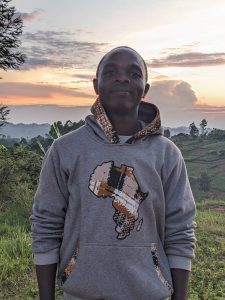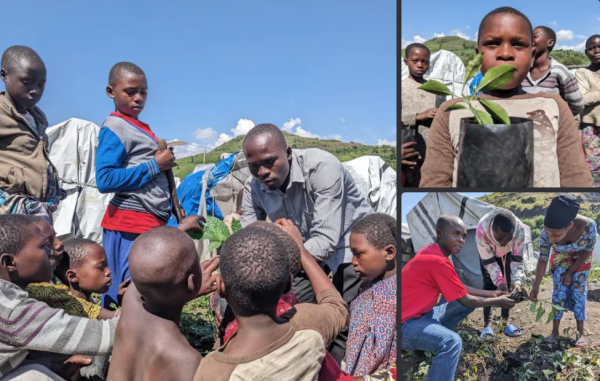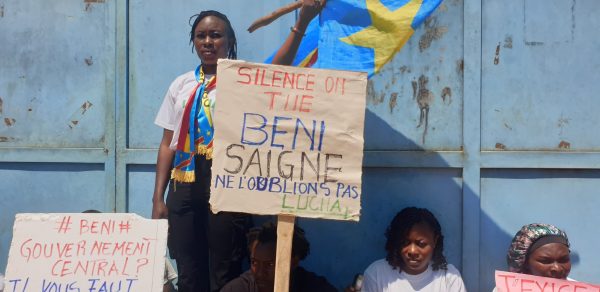Butembo, DRC | During a peaceful protest march against plans to put oil and gas blocks in the DRC’s Virunga up for public sale, we also called on the world to turn its gaze on the ecological transition that is taking place on the blood of the Congolese people. | Photo: XR Rutshuru
As violent militias rampage across the country, activists in the DRC are urgently calling for an end to Rwanda’s aggression and for a green transition that puts justice first, dismantling colonial exploitation once and for all. François Kamate, a young Congolese activist, shares his experience and offers pathways to solidarity
Reposted from Znet
Rutshuru, Democratic Republic of Congo | There are deadly links between war, the plunder of resources, and climate breakdown. Blood red stains follow their concurrence across the map from Iraq, to Amazonia, to Gaza – no inhabited continent is unmarked. And nowhere are these links more devastatingly clear than in the Democratic Republic of Congo, where M23 militias financed by the Rwandan government, which is in turn funded by the EU, UK, USA, and others, are committing mass murder and ecological destruction.
The DRC receives little attention in mainstream media and is usually portrayed, if at all, as a poor nation with a “complicated”, conflict-riven backstory. But this framing omits the catalyst for the region’s violence since its colonization – resource robbery.
“The conflict, which has persisted in the east of the DRC for almost 30 years, and is the deadliest since the Second World War, is mainly economic,” explains Nobel Laureate Dr. Denis Mukwege. Since 1996, more than 10 million people have been killed, with countless more being displaced, raped, or forcibly recruited (even as children) into armed groups. “The link between exploitation and the illegal trade in minerals is recognized as a root cause.”
From this brutal context, activists in the DRC are calling for the international community to immediately stop funding Rwanda’s aggression and to hold all who are complicit accountable. Refusing to abandon their right to a future, they are urgently calling for a green transition that puts justice first, not profit, and that dismantles colonial exploitation once and for all.
One of these young activists, François Kamate, spoke with me from the heart of the crisis in Eastern DRC. Our interview explores François’ experiences and organizing, as well as the current security, humanitarian, and ecological crises in the DRC.

Please introduce yourself and describe how you became an activist.
My name is François Kamate and I am a young climate and human rights defender in the DRC. Currently, I’m not studying due to the recurrence of armed conflict in my province of North Kivu since the end of 2022. In this context of violence, I initiated a local chapter of Extinction Rebellion, XR Rutshuru, to organize and mobilize young volunteers through non-violent actions to demand participatory and responsible governance of protected areas in the DRC.
Through other associated movements such as Amani Institute ASBL, where I am a co-founding member, I try to help community members rebuild themselves psychologically despite the traumatic ordeals they undergo on a daily basis. Amani Institute ASBL is a socio-cultural movement of young volunteers working to promote a culture of peace and grassroots community development in Eastern DRC. We’ve been operational in the province of North Kivu since 2016, with over 500 young volunteers. The head office is in the rural commune of Rutshuru with sub-delegations throughout the region.
We organize psychodrama-style participatory forums (theaters) to dissuade young people from joining the armed groups that swarm the region. Especially, we try to empower women survivors of sexual violence and young mothers abandoned by their husbands. This is a common problem as many young men join militias or become destitute simply for lack of work. In response to increasing numbers of internally displaced people in the region, we also organize volunteers to help the displaced draw water and provide training on how to combat water-borne diseases.
My motivation for initiating both groups stemmed from our community’s traumas – in particular, the unprecedented humanitarian tragedy coupled with the effects of global warming that are already being acutely felt. I challenged myself to dissuade young people from joining armed groups, and instead to work together to create positive change in the community.

The DRC is an extremely resource-rich nation yet has suffered a long history of colonialism, economic imperialism, and extractivism. As global finance gears up for “green growth”, the DRC’s resource wealth continues to attract violence, resource robbery, and ecological destruction. Could you talk more about some of the campaigns you’re involved in that fight for climate justice in this context?
Over the past several years, I’ve participated in campaigns like Fossil Free Virunga, Decolonize Virunga, and Fossil Free DRC. We have had a dual approach of organizing outreach and dialogue inside communities, since the authorities and extractive corporations are never transparent with the people. Once communities have access to information about the effects of extractive projects and about who does and does not benefit from them, we then help empower them with skills and support in nonviolent resistance as they stand up for their rights. It’s about communication and empowerment starting where we live and joining together.
I am currently involved in the #SaveVirunga campaign. We organize non-violent and peaceful activities to pressure the Congolese authorities, including President Félix Tshisekedi, to cancel tenders for the illegal sale of 27 oil blocks and 3 gas blocks located in vulnerable protected areas. This includes Virunga National Park, one of the oldest national parks in Africa whose conservation provides livelihoods for over 5 million people through fishing, livestock and agriculture. It should be noted that this sale is being pushed through by government authorities in violation of Congolese conservation laws.
But corruption and resource robbery is not limited to national borders. Extractivism is a trans-national project, so we must also organize internationally. Oil companies such as Total Enérgie, Alfajiri, Sympion Red Power, as well as mining and tech firms have shown that they are fine with keeping the Congolese people in the climate chaos we are experiencing as long as they have access to cheap and plentiful resources.
In May, we held a joint rally with XR activists in Germany and DRC simultaneously to highlight how the Congolese people are being exploited by tech companies for natural resources. An Apple shop in Berlin was spray-painted, while more than 200 activists rallied outside under banners of #BreakTheSilence. At the same time, activists marched through Butembo in the DRC, calling for Virunga National Park to be protected from oil and gas extraction, and for the world to recognize that an ecological transition cannot be smeared with the blood of the Congolese people.

Describe the escalating security and humanitarian situation in the region and how that has affected you and your work?
This work is ever more challenging as it is ever more urgent. The security and humanitarian situation around our regional capital, Goma, has now gotten so bad that we are no longer able to organize activities there. Fear is gaining ground among the population. Nobody knows what might happen. We manage to get together with fellow activists to follow what’s going on.
The humanitarian situation is extremely alarming, with the fighting between the Congolese army (FARDC) and Rwanda-backed rebels (M23) causing the regional population to flee to Goma. It has further aggravated a chronic humanitarian crisis in the region, which has been plagued by recurrent armed violence for three decades. Some 7 million people have fled the fighting directly, and are living in makeshift sites on the outskirts of Goma in conditions of extreme poverty. These internally displaced people have no shelter, drinking water, food, sanitation, or clothing and have been largely abandoned by international humanitarian organizations.
Even after fleeing their homes, people are not finding safety. On May 3, after taking nearby Rubaya for its mineral reserves, M23 dropped bombs on IDP camps in Mugunga/Goma, killing displaced civilians. Armed bandits commit a number of atrocities in the outskirts and on the streets of Goma. Robberies, killings, murders and kidnappings of civilians are documented almost every week.
Unfortunately, the perpetrators are never arrested or identified by the security services. M23 militias now occupy and administer three of the six territories in North Kivu province (Rutshuru, Masisi, and Nyirogongo). Goma itself is suffocating as the villages that supply it with food are occupied by militias and traffic is not operational.

What is your view of domestic and regional politics in relation to the current crises and to ongoing extractivism?
With these few sentences, I’d like to say that the Congolese people are fed up. And to repeat that the ecological transition should not be made on the blood of the Congolese people. The DRC’s resources have been profitably exploited by foreign corporations and co-opted local elites for decades, while local communities receive no benefit and are further destabilized. This is not development, this is looting.
Domestically, we need our national authorities to make a great effort to ensure security and peace for all Congolese people. While the international and regional community should stop being hypocritical by on one hand condemning M23 violence and lamenting poverty yet striking profitable deals with these same looters and their partners, or by engineering resource control under the guise of security. The blood of millions of Congolese people, innocently spilled, demands justice.
I deplore the national and regional policy on everything that is happening in the DRC. Nothing has been done to bring social and distributive justice to all the Congolese people from independence to the present day. Already mowed down by repeated wars, rampant poverty, mass unemployment among young people, disease, lack of community infrastructure, etc, the Congolese people have been left to fend for themselves.
What is inadmissible is the fact that in the current crisis, only the average Congolese is suffering enormously, while regional and national leaders are enriching themselves on the backs of the people. This must stop. Justice means shared happiness between people without distinction.
Another component deserves mention here as well – this is about breaking the silence. Mainstream media has consistently failed to cover the crises we face, and certainly has failed to name the true causes of our decades long suffering: neo colonial structures of global finance and trade, neoliberal policy, and extractivism. Instead, racist and incomplete narratives occasionally grace the headlines, if at all. Yes, internally we suffer from corruption and intercommunal violence – but they are symptoms, even features, of these oppressive systems. We suffer all the benefits of capitalism, but will no longer be silenced.

You mentioned foreign intervention for security. What is public opinion about international and regional military interventions that have been active in the DRC in the name of peacekeeping, such as UN (MONUSCO), East African (EACRF), and Southern African (SADC) troops?
In fact, external military interventions in the DRC, mainly in the eastern part of the country, have already shown their limits to the point that everyone is wondering exactly why they are in the DRC in the first place. Since these forces have been in the Congo, the situation has remained the same. Populations are being massacred close to their military bases without the slightest intervention on their part, which puzzles everyone.

There’s a black hand behind what’s happening in the DRC, especially regarding illicit exploitation of raw materials (gold, uranium, cobalt, cassiterite, cobalt, zinc, etc). There are people and corporations benefiting from resource robbery while external military intervention hasn’t protected the people. There have been many examples where military troops have been deployed in the name of peacekeeping, yet function more like private security for mines and fossil fuel extraction rather than protecting civilians. The beneficiaries are foreign billionaires like Dan Gertler and the country’s corrupt authorities. Capitalists continue to plunder Congolese resources using the Congolese people.
Do you have a message for fellow activists on pathways for solidarity in the current context and in terms of fighting for systemic change? What does being an activist mean for you personally?
My message to fellow activists is to ask for their urgent solidarity in relation to this crisis we are enduring as a result of the unjust aggression by Rwanda and its extractivist partners. Join our call for an end to this hypocrisy on the part of the international community. The blood of the Congolese people has long been shed freely, and this must stop.

Looking ahead, we must join together to pursue a more just world for all people within safe and healthy planetary bounds. What does doing this mean specifically? I can only suggest that you can start where I started. We all can look around our communities and challenge ourselves to work together to make positive changes. Then we need to continue to look around wider and understand how we are all connected, and see that our struggles are also connected. This is how we empower justice.
To be an activist for me means to enable others to achieve common goals. I’m proud to be an activist because I’m convinced that the fight we’re waging is going to change history. What motivates me is indignation at everything we’re going through. I tell myself that I have to work to make communities aware of the problems we face, so that together we can hold our leaders to account and give power to the people.
Solidarity, for me, means for others to try and do the same.
François Kamate is a young climate and human rights defender from North Kivu province, Democratic Republic of Congo. He is a co-founding member of Amani Institute ASBL and Extinction Rebellion Rutshuru and is active with various aligned groups and campaigns such as #SaveVirunga and LUCHACongo.org.
Alexandria Shaner is a sailor, writer, and organizer. She is a staff member of ZNetwork.org and active with Extinction Rebellion, Caracol DSA, and the Women’s Rights & Empowerment Network.

